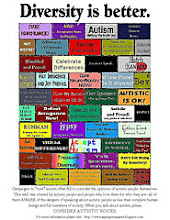Autism – back to basics
I think it’s time for a good old moan; a grumble on the topic of impairment to joint attention, one of the hallmarks of autism, a pivotal skill that’s adrift, so the experts tell me. The trouble is, when it comes to parenting an autistic child we are often advised to ‘trust our instincts.’ It is my experience that this is basically wrong, or perhaps more accurately, that my instincts are wrong. Lets just look at three of the basics. They’re universal, so I’m told. The power of speech is helpful but not essential.
First up:-
I am the parent. You are the child and we gave you a name. You have learned your name, so I call you, either because you’re hiding or you’re busy doing something, “Freddy, where are you?” You, Freddy, do not reply. It may be that you’re replying in your head but no words are coming out of your mouth. If you, Freddy, have no words, you could always just pop your head out of your room and wave, acknowledge that you heard me, aware that I’m searching for you – but of course you don’t. I don’t know what you do about this, but I take on both roles, my own as parent, and yours, as Freddy. I have an entire conversation with myself, speaking both roles:-
“Freddy, where are you?” “I’m here mum!” I wander round the house calling out these two lines until eventually, if I’m lucky, I’ll trip over Freddy and hopefully not hurt him in the process. It’s been like that for years.
Second:-
Pointing. Yes, I know it’s rude, but everyone does it when they’re little. Parents do it too, we actually teach our little ones to point, to be rude, because we’re a bit short sighted. Teach them how to point and then scrap that, it’s rude, un-teach pointing. What a pointless exercise, unless of course they don’t point in the first place. An expert will draw a parents attention to this deficit:- “he doesn’t point, had you noticed?”
“Of course I’ve noticed, it’s just that he’s an exceptionally polite child, must come from having British parents.”
But of course it wasn’t.
Why is pointing important anyway? Because it smacks of joint attention, a shared experience; it’s absence is a red flag.
Third and last, my personal favorite:-
Hand leading. Again we don’t need words. I am not a big scary bear, I’m just a big lumpy parent, hand extended, soft and warm and inviting. It translates to ‘come with me.’ When a child makes this gesture to someone else, it has the same meaning. The underlying message is the key, again, it’s that element of joint attention, a skill that we are all supposed to have, innately, and yet it’s not there. It has to be taught. Each one of them has to be taught each skill, discretely, practiced and then generalized into all given or possible situations.
It is the absence of these three, amongst other things, that still catches me out even after all this time. I forget that they’re not there. I forget to remind them and to practice because if they’re not practiced, they’re lost. It’s not just like riding a bicycle, but much more difficult.
Too much of a tirade?
Possibly.
Why mention it then?
I suppose because it’s IEP time, triennial in fact. Suddenly we’re presented with another whole host of deficits, negatives, holes, and shortcomings, all in black and white, with graphs and statistics as back up.
We’re reminded because we need to stay on track, not become complacent – yes we’re parents but we’re supposed to be dragoons, always forging ahead. I become swept up with the urgency as the grains in the timer escape and drift away. Wipe out those negatives, re-train, re-teach, reinforce, so much so that I’m apt to forget the bonuses, those freebies that are of no great import, except to us. It reminds me of "John Elder Robinson," how he learned to conform and yet lost so many of the superb abilities he had as a child, an alternative view that he’s been unable to recapture.
Yet it happened again today.
It happens most days one way or another, something that pulls me up short because I forget that they think so differently from me. Today as I reached over the sofa towards him, hand extended, called his name, beckoned with the other arm, he responded. He leapt onto the sofa and hung upside down over the back to examine my hand from underneath; an upside down aerial view. Silent. He moved each digit, an engineer checking the joints, fully functional, no creaks. He traced the lines on my palms and whorls on my fingertips, “mom?”
“Yes dear?”
“I cun see yur DNA.”





No comments:
Post a Comment